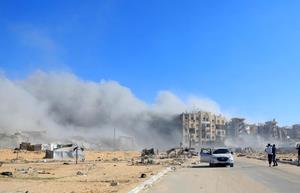
Pakistan's Military Faces Scrutiny Over Symbolic Gaza Solidarity
Despite a series of public statements condemning Israeli aggression and calling for“Muslim unity”, observers argue that these gestures are largely symbolic and fail to reflect any meaningful policy shift.
According to a commentary published by 'Middle East Monitor', the timing of these declarations is often conspicuously aligned with moments of heightened global outrage -- when images of Palestinian children killed in airstrikes dominate international media, or when ceasefire negotiations are underway. At such junctures, Pakistani officials, particularly from the defence ministry, issue solemn proclamations of support, the article said.
However, critics contend that these statements serve more as political theatre than genuine diplomatic positioning.“The performance is so transparent,” the analysis noted,“that even the clumsiest village drama troupe might blush at its lack of subtlety.”
The deeper issue, according to the analytical article, lies in the entrenched priorities of Pakistan's military elite. For decades, the generals in Rawalpindi have operated not as defenders of Muslim causes but as strategic actors serving whichever foreign patron secures their privileges.
From dispatching troops to suppress uprisings in Arab states to supporting the US military operations, Pakistan's armed forces have consistently aligned with power centres that offer financial or diplomatic benefits.
The Palestinian cause, the report suggests, is treated as a rhetorical tool -- invoked when domestic sentiment demands a show of empathy, but never pursued with conviction. This mercenary instinct is often cloaked in language about“national interest” or“strategic balance”, but the underlying motive remains institutional self-preservation.
In a striking comparison, the analysis draws parallels between Pakistan's military structure and Zionist ideology. While publicly condemning Israel's actions in Gaza, Pakistan's generals are said to admire the Israeli model of a militarised state where the army dominates policy, controls resources, and thrives on perpetual crisis.
“In their fantasies,” the report states,“Pakistan becomes a Zionist state of South Asia -- minus the competence and global clout.”
The critique extends beyond Pakistan. Across the Muslim world, regimes with Islamic credentials have responded to Gaza's suffering with silence or complicity. Gulf monarchies maintain economic ties with Israel while offering minimal humanitarian aid. Turkey and Egypt, despite vocal condemnations, continue trade and border enforcement that reinforce the siege.
Ultimately, the analysis concludes that true solidarity lies not in official speeches but in grassroots activism. It is civilians -- activists, writers, and ordinary citizens -- who embody resistance. As Gaza continues to suffer, the gap between rhetoric and reality in Pakistan's corridors of power remains a source of growing public disillusionment.

Legal Disclaimer:
MENAFN provides the
information “as is” without warranty of any kind. We do not accept
any responsibility or liability for the accuracy, content, images,
videos, licenses, completeness, legality, or reliability of the information
contained in this article. If you have any complaints or copyright
issues related to this article, kindly contact the provider above.
Most popular stories
Market Research

- Forex Expo Dubai 2025 Returns October 67 With Exclusive Prize Draw Including Jetour X70 FL
- Xfunded Expands In Dubai, Strengthening Collaborations With Trading Influencers Across Europe
- SPAYZ.Io White Paper Explores Opportunities, Challenges And Ambitions In Payments Industry
- B2BROKER Taps Finery Markets To Power Institutional Crypto OTC On B2TRADER
- Zebu Live 2025 Welcomes Coinbase, Solana, And Other Leaders Together For UK's Biggest Web3 Summit
- Daytrading Publishes New Study Showing 70% Of Viral Finance Tiktoks Are Misleading




















Comments
No comment